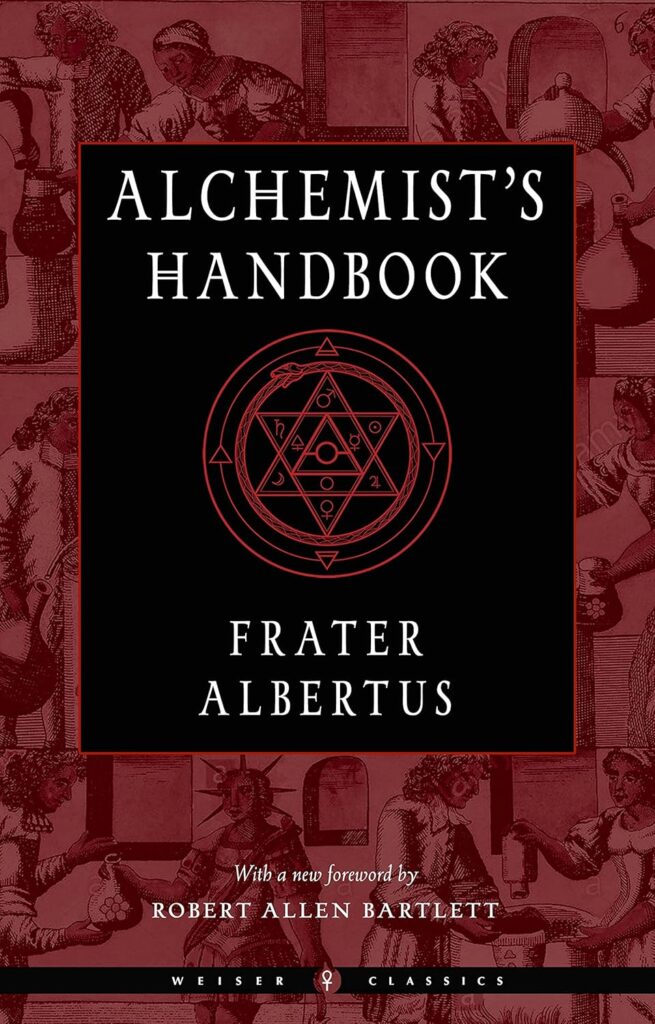Albertus, Frater, Bartlett, Robert Allen, Regardie, Israel
Review of The Alchemist’s Handbook by Frater Albertus
A Practical Magnum Opus in Miniature
In 1960, when The Alchemist’s Handbook first appeared, few could have imagined that a slim manual could reshape the modern study of alchemy. Frater Albertus — born Albert Richard Riedel, founder of the Paracelsus Research Society — set out to cut through centuries of allegory, secrecy, and misunderstanding. What emerged was a work at once humble in scope and radical in ambition: a book that treats alchemy not as dusty metaphor, nor as a quaint historical curiosity, but as a living, breathing laboratory practice.
Albertus’s central claim is deceptively simple: alchemy is “the raising of vibrations.” From this unassuming axiom radiates the book’s dual vision — part chemistry primer, part spiritual manual. It is a text that insists one cannot approach the transmutation of matter without simultaneously engaging the transmutation of self.
Clarity Amid the Fog of Secrecy
Israel Regardie, the Hermetic scholar and Golden Dawn adept, praised this work as “literally worth its weight in gold.” That judgment holds. Where traditional treatises obfuscate behind emblems of the “Peacock’s Tail” or the “Red Lion,” Albertus dares to say plainly what must be done: grind the herb, extract its essence through alcohol, calcine the residue to ash, recombine essence and salt. From these steps emerges the spagyric tincture — the “lesser circulation” that, in his framing, prefigures the Great Work itself.
The descriptions are meticulous without lapsing into pedantry. He offers not just recipes, but principles: patience above all; respect for the three kingdoms of nature (vegetable, animal, mineral); recognition that each has its Salt, Sulphur, and Mercury. The laboratory is presented not as a sorcerer’s den but as an extension of the classroom, outfitted with Soxhlet extractors, retorts, and calcining dishes that any diligent student might acquire.
A Book That Refuses Easy Comfort
Yet The Alchemist’s Handbook is not a breezy “how-to.” Albertus warns the reader repeatedly: this path requires “great dedication of purpose, sincerity and willingness to pursue this path to the bitter end—no matter at what cost.” He reminds aspirants that greed, shortcuts, and fantasies of instant gold will leave them stranded. The novice is to expect failures, expenses, heartaches — and perhaps lifetimes of effort — before even glimpsing the greater Arcanum.
This moral severity distinguishes Albertus from both the charlatans who peddled gold-making schemes and the Jungians who turned alchemy into dream-symbol. For Albertus, alchemy is neither fraud nor metaphor, but a demanding art that asks the practitioner to risk time, health, and ego in pursuit of a higher order of knowledge.
Between Science and Sacrament
One of the book’s enduring fascinations is its precarious dance between chemistry and sacrament. Albertus is unafraid of laboratory glassware and chemical terminology, yet insists that the true quintessence sought is no material substance alone, but a spiritual essence. In this sense, The Alchemist’s Handbook occupies a middle ground between the empirical and the esoteric: as comfortable describing rectification of alcohol at 78°C as it is invoking the Hermetic axiom, “As above, so below.”
It is precisely this dual allegiance that has given the book its longevity. To the scientifically inclined, it offers procedures verifiable in the lab. To the spiritually inclined, it preserves the sense of initiation, of sacred oath, of transmutation as self-overcoming. Few texts in the modern alchemical revival manage this balance with such grace.
The Shadow of Paracelsus
Albertus positions himself as heir to Paracelsus and Basil Valentine, reclaiming their role not as charlatans but as forefathers of modern medicine and chemistry. By reasserting the medicinal value of spagyric tinctures, he offers a subtle critique of allopathic medicine’s narrow scope. Herbs, purified and elevated through alchemical processes, are not mere folk remedies but embodiments of vibratory principles that touch both body and spirit.
Here the text edges into controversy. To a conventional scientist, talk of quintessence and vibrational rates may seem metaphysical overreach. But Albertus insists that just as chemistry once transformed the impossible into the routine, so too may alchemy be vindicated when approached with sincerity and precision.
Influence and Afterlife
Nearly six decades on, The Alchemist’s Handbook remains a touchstone. Its republications, workshops, and the legacy of the Paracelsus College have seeded alchemical study across continents. Among herbalists, occultists, and esoteric experimenters, it is perhaps the most frequently cited modern manual.
Critics may note its empirical limitations, or fault it for promising more than laboratory tinctures can deliver. Yet even its detractors admit: no other text renders alchemy so approachable without draining it of mystery. It belongs as much on the shelf of the chemist as on the altar of the mystic.
Final Appraisal
The Alchemist’s Handbook is not a large book, but it is a consequential one. It dares to teach openly what for centuries was whispered in riddles, yet without collapsing alchemy into mere chemistry or stripping it of its sacred charge.
To read it today is to glimpse a moment when ancient art and modern science nearly clasped hands — when glassware became a vessel not only for extraction but for initiation. Albertus offers no guarantee of gold, but something rarer: a method by which the diligent might discover, through fire and patience, that the work upon matter is inseparable from the work upon the self.
In that, this handbook earns its place as one of the most enduring contributions to the alchemical revival of the twentieth century.
⭐ Verdict: A luminous, uncompromising classic — essential for anyone serious about the practical and spiritual dimensions of alchemy.
Or you can hold it in your hands.

